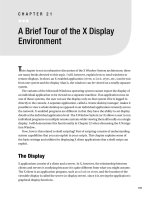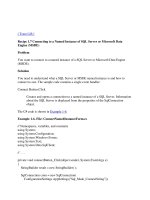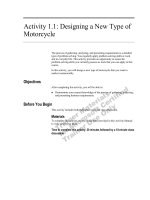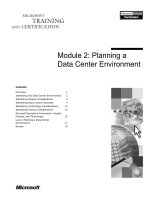A Designated Center of Academic
Bạn đang xem bản rút gọn của tài liệu. Xem và tải ngay bản đầy đủ của tài liệu tại đây (547.63 KB, 26 trang )
A Designated Center of Academic Excellence in Information Assurance Education by the National Security Agency
CS222:
Systems Programming
Memory Management III
February 26
th
, 2008
2 2/27/2008
Last Class
Memory Management
– Overview
– Heap management
– Memory-mapped files
– Dynamic link libraries
CS222 - Systems Programming
3 2/27/2008
Today’s Class
Memory Management
– Overview
– Heap management
– Memory-mapped files
– Dynamic link libraries
CS222 - Systems Programming
HW1 Grading Delay
Will be returned ASAP
4CS222 - Systems Programming 2/27/2008
Free software from Microsoft
Microsoft is giving away free software to
students:
– Visual Studio 2005 & 2008 Professional
– Microsoft Expression Studio
– Windows Server 2003 Standard
– XNA Game Studio
– SQL Server 2005 Developer Edition
/>5CS222 - Systems Programming 2/27/2008
Efficient Programming
How can we be more efficient at
programming?
6CS222 - Systems Programming 2/27/2008
7 2/27/2008
Dynamic-Link Libraries
DLL is a module that contain functions
and data that can be used by another
module (application or DLL)
It can define two kinds of functions
– Exported
• Intended to be called by other modules
– Internal
• Intended to be called only from within the DLL
CS222 - Systems Programming
8 2/27/2008
Dynamic-Link Libraries
2 types of dynamic linking
– Load-time linking (Implicit)
• Required to link the module with the import library (.lib
and .dll files)
• Easier to use
– Run-time linking (Explicit)
• Use LoadLibrary or LoadLibraryEx to load the DLL
at run time
• Use GetProcAddress function to get the addresses for
the exported DLL functions
CS222 - Systems Programming
9 2/27/2008
DLL and Memory Management
A process that loads the DLL
– Maps it into its own virtual address space
– Calls the exported DLL functions
A per-thread reference count for each DLL is
maintained
– When a thread loads the DLL, the count is
incremented
– When the count becomes zero, the DLL is
unloaded
CS222 - Systems Programming
10 2/27/2008
DLL and Memory Management
An exported DLL function runs in the
context of thread that calls it
– The DLL uses the stack of the calling
thread and the virtual address space of the
calling process
– The DLL allocates memory from the virtual
address space of the calling process
CS222 - Systems Programming









